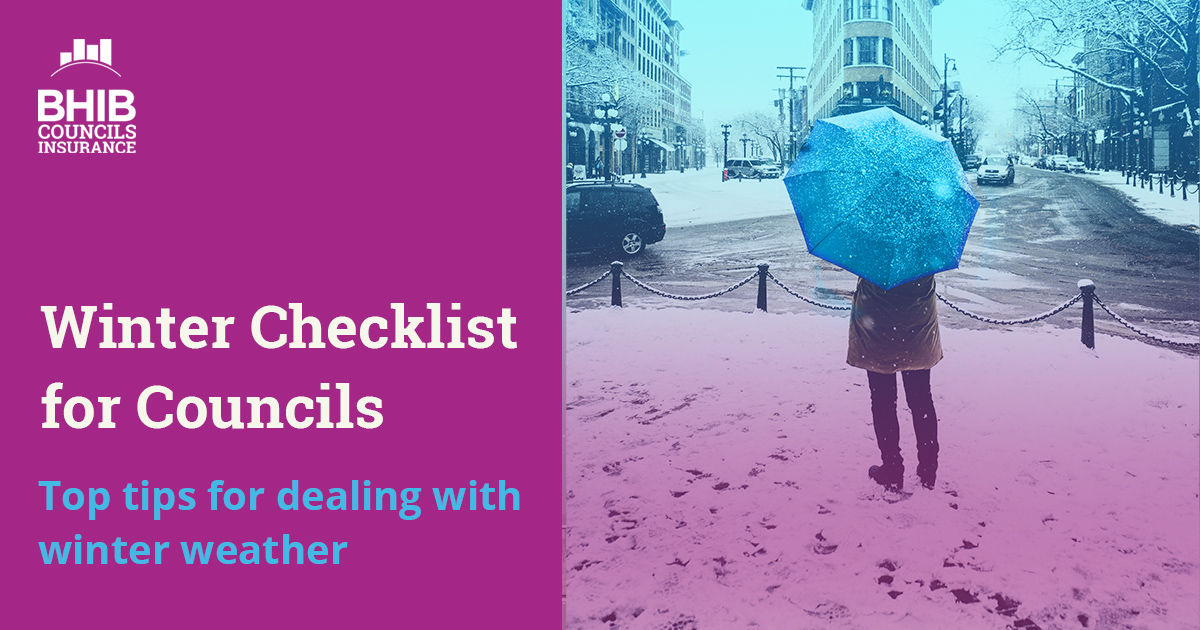Winter weather can present a lot of challenges to town and parish councils from a risk management perspective. During the winter months your roads, car parks, walkways, stairs/steps, bus shelters, playground etc. can become hazardous as snow falls and ice forms.
To make sure your council is well prepared this winter, we have produced a Winter Checklist – that is free to download – as well as our top tips for dealing with winter weather.
Winter Checklist for Councils
It is important for town and parish councils to have a thorough winter maintenance programme, which should:
- Include an equipment plan (e.g. shovels for gritting)
- Identify who is responsible for each task
- Detail the follow-up procedures for snow removal
- Layout your communications plans with the wider community
It is also important to regularly review your winter programme to make sure that it evolves with the weather so you are well prepared to manage the risks ahead.
To help with this process, download our free Winter Checklist for Councils now.
Tips for dealing with winter weather
For any local council, severe weather conditions can have an impact on the ability to deliver services effectively. It can also increase risks regarding the health and safety of employees, contractors, volunteers and members of the public.
Below we have provided some useful tips on keeping your buildings safe, preventing slips and trips, protecting your staff and dealing with hazardous road conditions.
If you require any more specific risk management advice, please get in touch directly using our contact form.
Buildings
Rain, snow, ice and wind can all put extra strain buildings and increase the chances of damage – both externally and internally. During the winter months it is recommended that you increase the frequency of property inspections to make sure there are no problems and to identify any issues early.
You should pay extra attention to the more ‘at-risk’ areas such as roofs, gutters, chimneys and water pipes. Frozen pipes are a particular risk in cold temperatures, and an escape of water can cause major damage.
For more advice on this, read our guide: Managing your Buildings and Pipes during Winter: Risk Advice for Local and Parish Councils
Protect against slips and trips
Less daylight during winter, wet leaves on the ground and the potential for ice patches all contribute to an increased risk of slips and trips. As this risk is foreseeable during the winter months, it is vital that councils take steps to minimise any accidents as much as possible.
The Health and Safety Executive (HSE) provides detailed guidance for reducing the risk of slips and trips in winters, including activities such as removing wet and decaying leaves, providing adequate lighting, dealing with rainwater and gritting key access routes.
View the full advice here: HSE – Icy conditions and winter weather
Protecting your staff
It is also important to assess how the cold weather might affect your staff – and to take reasonable steps to manage this.
For staff who work indoors, it is recommended that the workplace be at least 16 degrees Celsius. In freezing conditions, maintaining this temperature throughout the premises can put extra strain on heating systems and boilers – raising the likelihood of a breakdown. Therefore, it is important to make sure all heating systems are checked and serviced regularly to ensure they are capable of handling extended periods of cold weather.
Some extra considerations need to be made for those working outdoors – including those gritting or clearing leaves at your premises. These include:
- Providing suitable personal protective equipment (PPE)
- Providing a warm area for rest breaks
- Ensuring workers have a means of summoning help or assistance if working alone
- Briefing staff on the health effects of working outdoors in cold weather and what symptoms to look out for
Guidance from the HSE is also available to help protect your employees’ when working outdoors.
Dealing with hazardous road conditions
The more severe weather and longer periods of darkness makes driving more hazardous during the winter. It is therefore important for councils to consider any additional challenges this may present to your employees, contractors, volunteers and members of the public.
As a minimum, it is recommended that you develop a ‘winter driving policy’. This should include the central question of whether the journey needs to be made during adverse weather conditions and, if it does, what actions can be taken to make it as safe as possible e.g. altering schedules, providing more time to make appointments so employees can drive at safe speed etc.
Policies can also include advice and guidance on preparing vehicles before journeys, including any additional equipment that might be needed, and explaining any actions to take in an emergency or breakdown situation.
It is important for town and parish councils to have a plan in place for winter so that staff are fully informed and aware of what to do when weather conditions worsen. For help with developing your plan, download our Winter Checklist for Councils now.
Specialist Insurance for Local Councils
We are passionate about delivering tailored insurance solutions for Local Councils.





